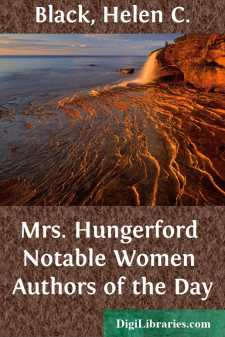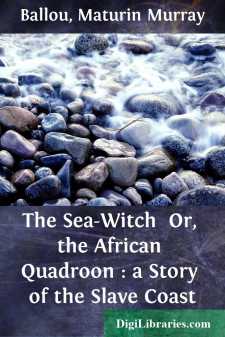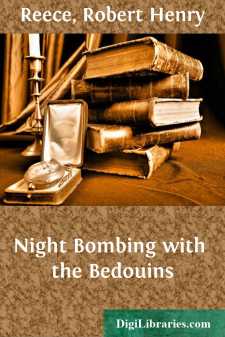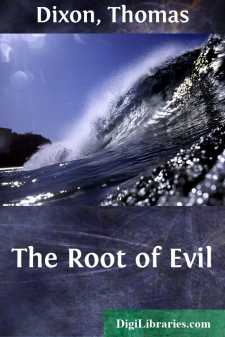Categories
- Antiques & Collectibles 13
- Architecture 36
- Art 48
- Bibles 22
- Biography & Autobiography 813
- Body, Mind & Spirit 142
- Business & Economics 28
- Children's Books 15
- Children's Fiction 12
- Computers 4
- Cooking 94
- Crafts & Hobbies 4
- Drama 346
- Education 46
- Family & Relationships 57
- Fiction 11828
- Games 19
- Gardening 17
- Health & Fitness 34
- History 1377
- House & Home 1
- Humor 147
- Juvenile Fiction 1873
- Juvenile Nonfiction 202
- Language Arts & Disciplines 88
- Law 16
- Literary Collections 686
- Literary Criticism 179
- Mathematics 13
- Medical 41
- Music 40
- Nature 179
- Non-Classifiable 1768
- Performing Arts 7
- Periodicals 1453
- Philosophy 64
- Photography 2
- Poetry 896
- Political Science 203
- Psychology 42
- Reference 154
- Religion 513
- Science 126
- Self-Help 84
- Social Science 81
- Sports & Recreation 34
- Study Aids 3
- Technology & Engineering 59
- Transportation 23
- Travel 463
- True Crime 29
Mrs. Hungerford Notable Women Authors of the Day
by: Helen C. Black
Categories:
Description:
Excerpt
It is well worth encountering the perils of the sea, even in the middle of winter, and in the teeth of a north-east wind, if only to experience the absolute comfort and ease with which, in these space-annihilating days, the once-dreaded journey from England to the Emerald Isle can be made. You have resolved to accept a hospitable invitation from Mrs. Hungerford, the well-known author of Molly Bawn, etc., to visit her at her lovely house, St. Brenda's, Bandon, co. Cork, where a 'hearty Irish welcome' is promised, and though circumstances prevent your availing yourself of the 'month's holiday' so kindly offered, and limit an absence from home to but four days, it is delightful to find that, travelling by the best of all possible routes—the Irish Mail—it is to be accomplished easily and without any fatiguing haste.
Having given due notice of your intentions, you arrive at Euston just in time for the 7.15 a.m. express, and find that by the kindness of the station-master a compartment is reserved, and every arrangement, including an excellent meal, is made for your comfort. The carriages are lighted by electricity, and run so smoothly that it is possible to get a couple of hours' good sleep, which the very early start has made so desirable. On reaching Holyhead at 1.30 p.m. to the minute, you are met by the courteous and attentive marine superintendant Captain Cay, R.N., who takes you straight on board the Ireland, the newest addition to the fleet of fine ships, owned by the City of Dublin Steam Packet Company. She is a magnificent vessel, 380 feet long, 38 feet in beam, 2,589 tons, and 6,000 horse-power; her fine, broad bridge, handsome deck-houses, and brass work glisten in the bright sunlight. She carries electric light; and the many airy private cabins indicate that, though built for speed, the comfort of her passengers has been a matter of much consideration. She is well captained, well officered, well manned, and well navigated. The good-looking, weather-beaten Captain Kendall is indeed the commodore of the company, and has made the passage for nearly thirty years. There is an unusually large number of passengers to-day, for it is the first week of the accelerated speed, and it is amusing to notice the rapidity with which the mails are shipped, on men's backs, which plan is found quicker than any appliance. Captain Cay remarks that it is no uncommon thing to ship seven hundred sacks on foreign mail days; he says, too, that never since these vessels were started has there been a single accident to life or limb. But the last bag is on board, steam is up, and away goes the ship past the South Stack lighthouse, built on an island under precipitous cliffs, from which a gun is fired when foggy, and in about an hour the Irish coast becomes visible, Howth and Bray Head. The sea gets pretty rough, but luckily does not interfere with your excellent appetite for the first-class refreshments supplied. The swift-revolving paddles churn the big waves into a thick foam as the good ship Ireland ploughs her way through at the rate of twenty knots an hour, 'making good weather of it', and actually accomplishes the voyage in three hours and fifteen minutes—one of the shortest runs on record. The punctuality with which these mail packets make the passage in all weathers is indeed truly wonderful—a fact which is experienced a few days later on the return journey. Kingstown is reached at 6.10 p.m. (Irish time), where the mail train is waiting to convey passengers by the new loop line that runs in a curve right through 'dear dirty Dublin', as it is popularly called, to Kingsbridge, and so on to Cork, where you put up for the night at the Imperial Hotel.
Another bright sunshiny morning opens, and shows old Cork at her best. Cork! the old city of Father Prout's poem, 'The Bells of Shandon', which begins thus: With deep affection and recollection
I often think of Shandon bells,
Whose sounds so wild would in days of childhood
Fling round my cradle their magic spells,
On this I ponder where'er I wander,
And thus grow fonder, sweet Cork, of thee;
With the bells of Shandon
That sound so grand on, etc....












